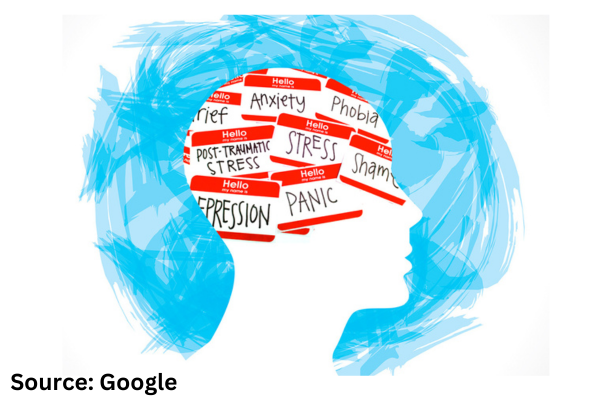In today’s fast-paced society, mental issues, a term that encompasses a spectrum of illnesses affecting the mind, are becoming more and more common. The phrase refers to a broad range of disorders that affect a person’s feelings, ideas, and actions. Since mental health issues can have a major impact on a person’s everyday life and general well-being, it is imperative that these issues be addressed.
The Complexity of Mental Health: Mental Issues
1. Defining Mental Issues
Mental health issues encompass various conditions, such as anxiety disorders, depression, bipolar disorder, and schizophrenia. These conditions are not only diverse but also complex, requiring a nuanced understanding for effective management and treatment. A person in a condition of mental health is able to manage life’s stressors, reach their full potential, learn and work effectively, and give back to their community. It is a vital aspect of health and wellbeing that supports our capacity as individuals and as a society to make choices, form bonds with one another, and influence the world we live in. A fundamental human right is mental health. Furthermore, it is essential for socioeconomic, communal, and personal growth.
2. The Importance of Mental Health Awareness
Acknowledging the prevalence of mental health issues is the first step towards fostering a society that prioritizes mental well-being. Creating awareness can break down stigmas and encourage open discussions, leading to better support systems for those affected. Our emotional, psychological, and social well-being are all parts of our mental health. It influences our feelings, thoughts, and behaviours. It also influences how we respond to stress, interact with people, and make wise decisions.1. Every stage of life, from infancy and adolescence to maturity, is critical for mental health.
Common Types of Mental Issues
3. Anxiety Disorders
Anxiety disorders manifest in excessive worry, fear, or apprehension. Generalized Anxiety Disorder (GAD), Panic Disorder, and Social Anxiety Disorder are common forms of anxiety disorders.
4. Depression
Depression, a pervasive and persistent low mood, affects millions worldwide. Understanding its symptoms and triggers is crucial for timely intervention and support.
5. Bipolar Disorder
Bipolar disorder involves extreme mood swings, including episodes of mania and depression. Recognizing the signs and managing the condition is vital for those diagnosed and their support networks.
6. Schizophrenia
Schizophrenia is a severe mental disorder characterized by distorted thinking, hallucinations, and impaired social functioning. Early diagnosis and appropriate treatment can significantly improve outcomes for individuals with schizophrenia.
Factors Contributing to Mental Issues
7. Genetic Predisposition
Genetics can play a role in predisposing individuals to certain mental health conditions. Understanding one’s family history can aid in early detection and preventive measures. A person’s heightened risk of contracting a specific disease due to their genetic composition is known as a genetic predisposition (often also referred to as genetic susceptibility). Certain genetic differences, which are frequently transmitted from parents, give rise to a hereditary predisposition.
8. Environmental Factors
Environmental factors, including traumatic experiences, chronic stress, and substance abuse, can contribute to the development of mental health issues. Identifying and mitigating these factors is crucial for prevention. Harmful substances, such as air pollution or proximity to toxic sites (the subject of classic environmental epidemiology), as well as access to a variety of health-related resources (e.g., healthy or unhealthy foods, recreational resources, medical care) are among the physical environment factors that are important to health.
9. Neurochemical Imbalances
Imbalances in brain chemicals, such as neurotransmitters, can impact mood regulation and contribute to mental health disorders. Pharmacological interventions may be necessary to restore balance.
Seeking Help and Treatment for mental issues
10. Professional Assistance
Seeking professional help is a crucial step in managing mental issues. Psychologists, psychiatrists, and therapists can provide tailored interventions to address specific conditions.

11. Therapeutic Approaches
Therapy, including cognitive-behavioral therapy (CBT) and dialectical behavior therapy (DBT), can be instrumental in managing and overcoming various mental health challenges.
12. Medication
In some cases, medication may be prescribed to address neurochemical imbalances. It is essential to work closely with healthcare professionals to find the most effective and suitable treatment plan.
The Role of Lifestyle in Mental Health
13. Exercise and Mental Well-being
Regular physical activity has been linked to improved mood and reduced symptoms of anxiety and depression. Incorporating exercise into one’s routine can positively impact mental health. Regular exercisers have reduced incidence of mental disease and improved mental and emotional wellbeing. People with mental illnesses should get regular exercise because it not only improves mood, focus, and alertness but also cardiovascular and general physical health.
14. Nutrition and Brain Health
A balanced diet rich in essential nutrients is crucial for optimal brain function. Certain vitamins and minerals play a role in supporting mental well-being. Similar to a high-end vehicle, your brain performs optimally when it is fed only premium gasoline. Consuming nutritious foods rich in vitamins, minerals, and antioxidants nourishes the brain and guards against oxidative stress, which is caused by free radicals, the “waste” that is created when the body utilises oxygen and can cause cell damage.
15. Sleep Hygiene
Quality sleep is fundamental to mental health. Establishing healthy sleep patterns and addressing sleep disorders can positively impact mood and cognitive function.
Here are a few routines that can help you sleep better:
Maintain consistency.
Ensure that your bedroom is peaceful, dark, well-lit, and the ideal temperature.
Take out all electronics from the bedroom, including computers, TVs, and smartphones.
Steer clear of heavy meals, caffeine, and alcohol right before bed.
Get moving.
FAQs
What are 10 mental problems?
Mental problems encompass a range of conditions such as anxiety disorders, depression, bipolar disorder, schizophrenia, PTSD, OCD, ADHD, eating disorders, personality disorders, and substance abuse disorders.
How can I be mentally okay?
Maintaining mental wellness involves various strategies including seeking support from loved ones or professionals, practicing self-care, exercising regularly, setting boundaries, managing stress, and seeking therapy or counseling when needed.
How to deal with mental issues?
Dealing with mental issues involves seeking professional help, practicing self-care techniques like mindfulness and relaxation exercises, building a support network, challenging negative thoughts, setting realistic goals, and maintaining a healthy lifestyle.
What are the 5 major mental issues?
The five major mental issues are depression, anxiety disorders, schizophrenia, bipolar disorder, and obsessive-compulsive disorder (OCD). These conditions can significantly impact a person’s thoughts, emotions, and behavior, requiring proper diagnosis and treatment.
Conclusion
In conclusion, understanding mental issues is paramount for fostering a society that prioritizes the well-being of its members. From recognizing common types of disorders to addressing contributing factors and seeking appropriate treatment, a comprehensive approach is essential. By promoting awareness, eradicating stigmas, and providing effective support systems, we can collectively work towards a world where mental health is given the attention and care it deserves. Remember, seeking help is a sign of strength, and everyone deserves the opportunity to lead a mentally healthy life.
